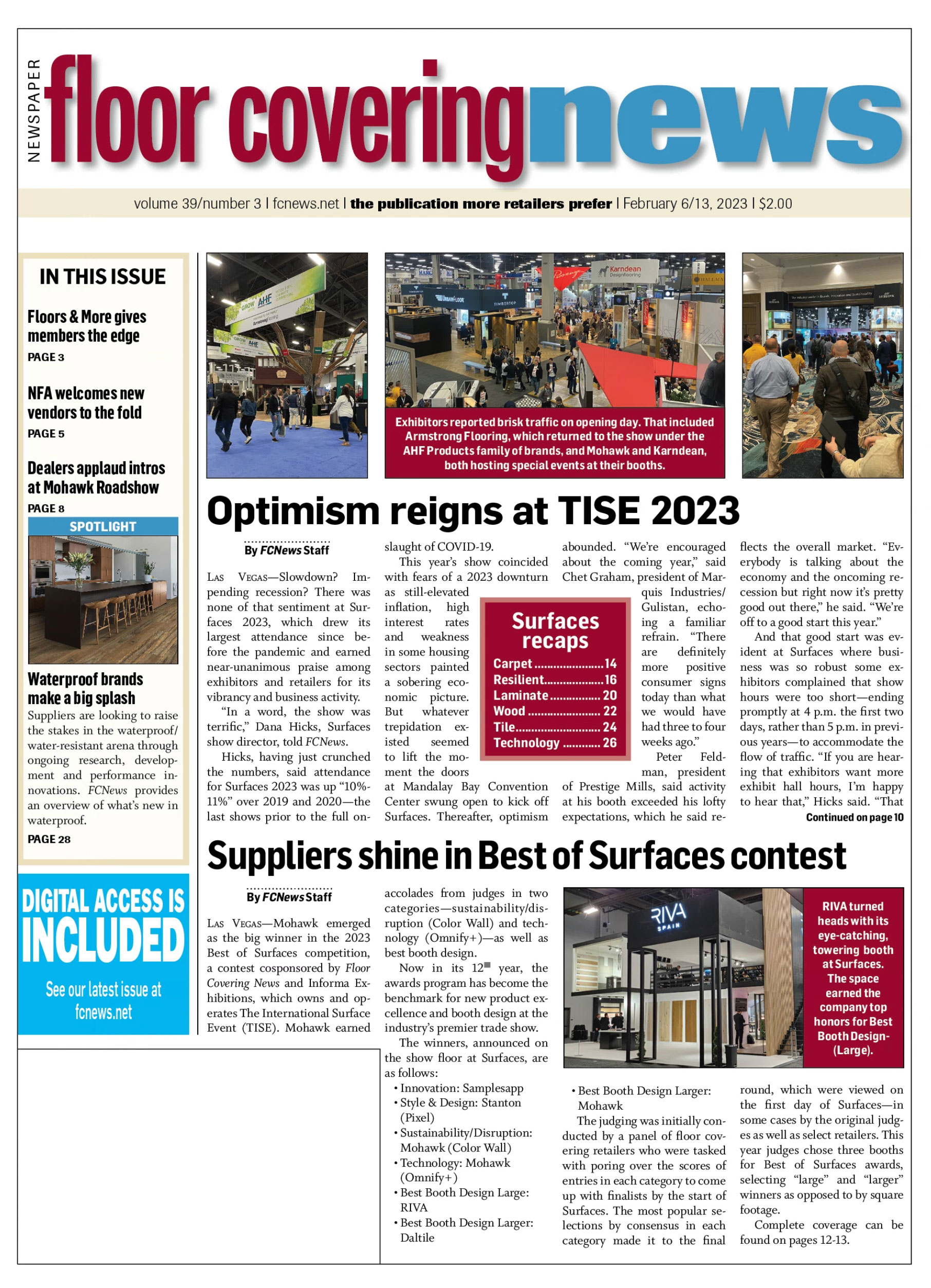 It’s no secret that in recent years credit card fees have been nipping at floor covering retailers’ profit margins. According to the Merchants Payments Coalition, an organization that represents retailers and others fighting for a more competitive and transparent card system, credit and debit card swipe fees have more than doubled over the past decade—soaring to 25% in 2021 alone to a record $137.8 billion.
It’s no secret that in recent years credit card fees have been nipping at floor covering retailers’ profit margins. According to the Merchants Payments Coalition, an organization that represents retailers and others fighting for a more competitive and transparent card system, credit and debit card swipe fees have more than doubled over the past decade—soaring to 25% in 2021 alone to a record $137.8 billion.
Indeed, credit card processing can be a shady business. “It’s kind of the ‘used car sales’ of finance,” noted Chad Ogden, president of QFloors, a software company that has created its own integrated credit card processing and customer financing options to help flooring businesses navigate this territory.
However, all is not lost. There are several tried-and-true practices flooring retailers can put in place to lower the fees. Among them:
- Swipe whenever possible
Transaction pricing, or interchange rates, are based on a variety of factors including merchant industry segment, type of card presented and if a transaction takes place in person or online. Swipe transactions come with more security—there is less potential for human error and, therefore, a reduced risk of fraud—so, they typically accrue lower processing costs. The more data you can capture during a credit card transaction (ZIP codes, etc.), the lower your processing fee is likely to be.
“Typically, the flooring dealer has no idea that it just cost him a lot of money simply because the sales rep didn’t type in a customer’s ZIP code,” Ogden noted.
- Negotiate credit terms
Floor covering retailers may not realize that while some portions of the credit card fee are nonnegotiable, the processing fee is. “When someone comes in to quote on a credit card, they’ll give a bid on what they’ll process your cards for,” Ogden said. “Bigger stores get a better deal.”
It pays, however, to proceed carefully before making a switch. “I probably get between six and 12 calls a week from credit card processing companies that say, ‘Our rate is better’ or ‘We can do better than your current rate’ before they even know what I’m paying or ask me who I’m with,” bemoaned Eric Thompson, president, Satolli Carpet & Floor Covering, Warren, Ohio. “It’s a racket.”
Specialty flooring dealers are catching on. “We lost a few sales a while back because we didn’t take American Express because the fees were so high,” noted a flooring retailer in the South-Central region of the U.S. who requested anonymity. “But I negotiated my [American Express] rates to match my Visa and MasterCard rates, and now we take Amex. We were able to do that because we’re a longtime retailer and do a pretty good volume.”
- Don’t opt for ‘flat-rate’
There are two main ways credit card processing fees are quoted: flat-rate pricing and cost-plus pricing. QFloors’ Ogden warned that while flat-rate pricing in the short term may sound like the better deal, it’s often more expensive.
“With flat rates the credit card company may charge, for example, 2.8% on every credit card sale you make,” he said. “The problem is the fees are not costing the credit card companies a flat rate—that rate depends on what cards the dealer takes. Since the company has to make sure it doesn’t lose money, the rates are set higher to cover almost 90% of transactions.”
Cost-plus pricing, however, is dependent on the credit card being used. “The cost-plus rate will always come out less than the flat rate because you don’t have to guess what you’re going to get charged,” Ogden explained. “You’re getting charged what you’re using.”
- Charge more for credit
Surcharging is the practice of “passing on” to the customer a small fee to a credit card transaction to help cover the merchant’s costs for processing the payment. Dealers like Cristina Besore, vice president of operations, Atlas Floor Co., San Antonio, Texas, officially began instituting surcharges about a year ago, mainly out of necessity. “These fees have been definitely going up,” she explained, “and we feel we have to do that. With everything else rising, it’s either that or raise our margin, and we are reluctant to do that.”
Besore is not alone. Kevin Columbro, president, Reliable Floor Coverings, Edmonds, Wash., began adding credit card surcharges this past fall. “It was costing more than $45,000 a year for processing fees,” he noted. “We have signs around the store to let customers know there’s a 3.5% processing fee for cards; if they bring in a check, they would save on the fee.”
Credit card surcharges are now legal in most states, but some states have bans or restrictions that retailers must follow, so compliance is key.
- Check your statements
QFloors’ Ogden found that nearly 80% of floor covering dealers with whom he has worked were being overcharged, amounting to thousands of dollars in fees that they shouldn’t have been paying. “There is a lack of transparency both with credit card processing rates and with statements,” Ogden explained. “Companies commonly (and purposely) make their statements confusing and ambiguous in order to hide junk fees and what the true rates are.”

